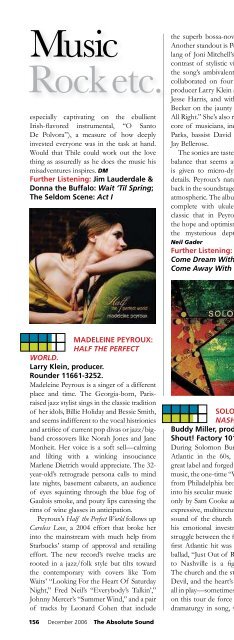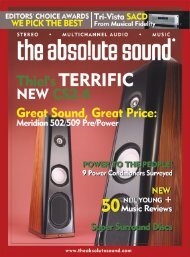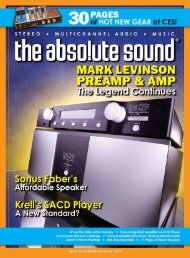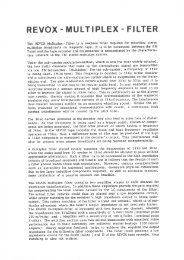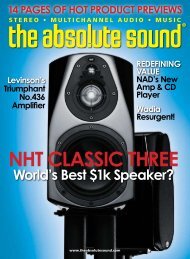You also want an ePaper? Increase the reach of your titles
YUMPU automatically turns print PDFs into web optimized ePapers that Google loves.
Music<br />
Rock etc.<br />
especially captivating on the ebullient<br />
Irish-flavored instrumental, “O Santo<br />
De Polvora”), a measure of how deeply<br />
invested everyone was in the task at hand.<br />
Would that Thile could work out the love<br />
thing as assuredly as he does the music his<br />
misadventures inspires. DM<br />
Further Listening: Jim Lauderdale &<br />
Donna the Buffalo: Wait ‘Til Spring;<br />
The Seldom Scene: Act I<br />
Madeleine Peyroux:<br />
Half the Perfect<br />
World.<br />
Larry Klein, producer.<br />
Rounder 11661-3252.<br />
Madeleine Peyroux is a singer of a different<br />
place and time. The Georgia-born, Parisraised<br />
jazz stylist sings in the classic tradition<br />
of her idols, Billie Holiday and Bessie Smith,<br />
and seems indifferent to the vocal histrionics<br />
and artifice of current pop divas or jazz/bigband<br />
crossovers like Norah Jones and Jane<br />
Monheit. Her voice is a soft sell—calming<br />
and lilting with a winking insouciance<br />
Marlene Dietrich would appreciate. The 32-<br />
year-old’s retrograde persona calls to mind<br />
late nights, basement cabarets, an audience<br />
of eyes squinting through the blue fog of<br />
Gaulois smoke, and pouty lips caressing the<br />
rims of wine glasses in anticipation.<br />
Peyroux’s Half the Perfect World follows up<br />
Careless Love, a 2004 effort that broke her<br />
into the mainstream with much help from<br />
Starbucks’ stamp of approval and retailing<br />
effort. The new record’s twelve tracks are<br />
rooted in a jazz/folk style but tilts toward<br />
the contemporary with covers like Tom<br />
Waits’ “Looking For the Heart Of Saturday<br />
Night,” Fred Neil’s “Everybody’s Talkin’,”<br />
Johnny Mercer’s “Summer Wind,” and a pair<br />
of tracks by Leonard Cohen that include<br />
156 December 2006 The Absolute Sound<br />
the superb bossa-nova-accented title track.<br />
Another standout is Peyroux’s duet with k.d.<br />
lang of Joni Mitchell’s “River,” an intriguing<br />
contrast of stylistic visions that underscore<br />
the song’s ambivalent theme. Peyroux also<br />
collaborated on four tunes with returning<br />
producer Larry Klein and Norah Jones alum<br />
Jesse Harris, and with Steely Dan’s Walter<br />
Becker on the jaunty survival anthem “I’m<br />
All Right.” She’s also reunited with her crack<br />
core of musicians, including guitarist Dean<br />
Parks, bassist David Piltch, and drummer<br />
Jay Bellerose.<br />
The sonics are tasteful, with a darker tonal<br />
balance that seems appropriate. Sensitivity<br />
is given to micro-dynamics and low-level<br />
details. Peyroux’s naturalistic vocals are set<br />
back in the soundstage, maintaining a clubby<br />
atmospheric. The album closes with “Smile,”<br />
complete with ukulele accompaniment, a<br />
classic that in Peyroux’s hands expresses<br />
the hope and optimism required to navigate<br />
the mysterious depths of life’s waters.<br />
Neil Gader<br />
Further Listening: Jane Monheit:<br />
Come Dream With Me; Norah Jones:<br />
Come Away With Me<br />
Solomon Burke:<br />
Nashville.<br />
Buddy Miller, producer.<br />
Shout! Factory 10179.<br />
During Solomon Burke’s glory years with<br />
Atlantic in the 60s, when he carried the<br />
great label and forged a path that led to soul<br />
music, the one-time “Wonder Boy Preacher”<br />
from Philadelphia brought the gospel spirit<br />
into his secular music with a fervor matched<br />
only by Sam Cooke and Ray Charles. In his<br />
expressive, multitextured vocalizing was the<br />
sound of the church and the street, and in<br />
his emotional investment was the eternal<br />
struggle between the flesh and the devil. His<br />
first Atlantic hit was a cover of a country<br />
ballad, “Just Out of Reach,” so this sojourn<br />
to Nashville is a figurative homecoming.<br />
The church and the street, the flesh and the<br />
Devil, and the heart’s deepest yearnings are<br />
all in play—sometimes all in the same tune—<br />
on this tour de force of quintessential soul<br />
dramaturgy in song, writ large by a largerthan-life<br />
character.<br />
The music comes from the likes of<br />
Bruce Springsteen, Don Williams, Tom<br />
T. Hall, Dolly Parton, George Jones, Jim<br />
Lauderdale, and Paul Kennerly; and the cast<br />
includes the E Street Band’s Garry Tallent,<br />
Willie Nelson’s indomitable harmonica<br />
man Mickey Raphael, roots masters Byron<br />
House and Sam Bush, and lap steel/pedal<br />
steel/dobro giant Al Perkins. Parton is<br />
formidable in shadowing Burke as he turns<br />
her “Tomorrow Is Forever” into a hymn<br />
of invitation. Emmylou Harris is a ghostly<br />
presence in turning George Jones’ “We’re<br />
Gonna Hold On” into a moment of dread<br />
and foreboding. But in the end it is the<br />
King who burns, whether he’s working a<br />
deep country-blues take on a stripped-down<br />
reconsideration of Hall’s “That’s How I Got<br />
To Memphis” or being wickedly ironic in<br />
his sly kiss-off of a lover who dumped him<br />
during Williams’ “Atta Way To Go.”<br />
In judiciously casting string sections and<br />
full-on bands populated by players both<br />
sympathetic and empathetic when it comes<br />
to walking the thin line between country and<br />
R&B, and masterfully blending acoustic and<br />
electric textures in the soundscape, producer<br />
Buddy Miller presents Burke in the best<br />
possible settings to bring out the richness<br />
of his crooning and electrifying brio of his<br />
gospel petitioning. They don’t often make<br />
’em like this anymore, but they made this<br />
one, and it’s a quite a moment. DM<br />
Further Listening: Various: Night<br />
Train To Nashville: Music City<br />
Rhythm & Blues, 1949-1970;<br />
Various: White Man’s Blues<br />
Lupe Fiasco: Lupe<br />
Fiasco’s Food &<br />
Liquor.<br />
Soundtrakk, Prolyfic, The Neptunes,<br />
Mike Shinoda, Kanye West, et al.,<br />
producers. Atlantic 83960.<br />
Hip-hop fans are in such need for artists that<br />
have some substance to offer that they’re<br />
often quick to embrace any up-and-coming<br />
MC who isn’t mindlessly rapping about<br />
drugs, guns, and sex. So it’s no surprise that<br />
talented lyricist Lupe Fiasco has been thrust


